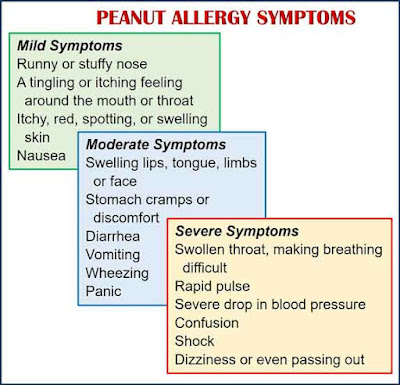Welcome back. As a scientist with the Federal Government, I regularly functioned as a Contract Officer’s Technical Representative managing a slate of research projects. On one occasion, a group of us were meeting with a new contract officer. She entered the room with an armload of folders, introduced herself and announced that she was very allergic to peanuts.
Though I’ve encountered many people with asthma and different allergies, including my own bouts of hay fever, which ended years ago (see Time for Allergies), that was my only direct experience with peanut allergy.
 |
| Possible symptoms of peanut allergy (taken from list in www.linkedin.com/pulse/symptoms-peanut-allergy-brian-w-wu-phd). |
In the US, peanut allergy is rated the most common food allergy in children and one of the most common food allergies in adults, affecting about 2% of the both populations.
A 2021 study by researchers with Northwestern University and the Mount Sinai School of Medicine found that approximately 4.6 million US adults are allergic to peanuts; more than 800,000 of whom appear to have developed the allergy after age 18.
Prevention Guidelines
Possibly the most important news about peanut allergy came in 2017. An expert panel, sponsored by the National Institute of Allergy and Infectious Diseases, released the Addendum Guidelines for the Prevention of Peanut Allergy in the United States.
 |
Introducing peanut-containing foods into the diets of infants at various risk levels for peanut allergy (cover photo of www.niaid.nih.gov/sites/default/files/addendum-peanut-allergy-prevention-guidelines.pdf). |
Guidelines Status Report
Researchers with Northwestern University and the Ann & Robert H. Lurie Children’s Hospital of Chicago recently published a study, which involved the first nationwide survey of the impact and implementation of the addendum guidelines.
The survey was administered between January and February 2021 to a population-based sample of 3,062 US parents/caregivers of a child age 7 months to 3.5 years.
Survey Responses
The survey found 13.3% of respondents were aware of the Prevention of Peanut Allergy Guidelines. Those more likely to be aware were white, 30 to 44 years old, educated, high income or caring for a child with food allergy or eczema.
Whether they were aware of the guidelines or not, 47.7% of survey respondents believed that feeding peanuts early prevented peanut allergy; 17.2% first offered peanut-containing foods before age 7 months, 41.8% did so between ages 7 and 12 months. Peanut introduction occurred earlier among guidelines-aware parents/caregivers; 31% began before 7 months.
Overall, 57.8% of respondents reported discussing peanut introduction with their primary care provider. The providers’ counseling was the most common facilitator for peanut introduction before 7 months,
Fear of reactions was the most common reason for delaying peanut introduction beyond 7 months (32.5%). Yet only 1.4% of respondents reported infant and child reactions during peanut introduction. The reactions were mostly dermatological (e.g., a rash) or gastroenterological (e.g., vomiting). Previous studies have found that, on average, infant reactions are much milder than older children’s reactions.
Wrap Up
The researchers concluded that early peanut introduction is gaining traction among US parents/caregivers; however, disparities exist. Efforts to increase guidelines adherence need to:
- Address care barriers and systemic racism that make information less known to non-white, less-educated and lower-income parents.
- Support medical providers to make information available in a timely way.
- Educate the public about reactions to peanuts, the main fear reported in the survey.
While my former contract officer and other adults will need a different approach, at least peanut allergy in children can be substantially reduced. Thanks for stopping by..
P.S.
US allergy statistics in Allergy & Asthma Network: allergyasthmanetwork.org/allergies/allergy-statistics/
Study of peanut allergy in US adults in The Journal of Allergy and Clinical Immunology: www.jacionline.org/article/S0091-6749(20)32412-X/fulltext
Addendum Guidelines for the Prevention of Peanut Allergy in the United States: www.niaid.nih.gov/sites/default/files/addendum-peanut-allergy-prevention-guidelines.pdf
Study of peanut introduction in Pediatrics journal: publications.aap.org/pediatrics/article-abstract/doi/10.1542/peds.2022-059376/192815/Early-Peanut-Introduction-Awareness-Beliefs-and?redirectedFrom=fulltext
Article on study on EurekAlert! website: www.eurekalert.org/news-releases/996256

No comments:
Post a Comment